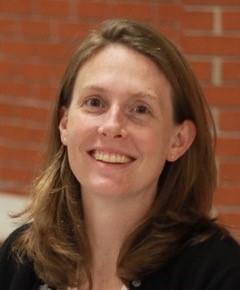 Sarah Jane White studies the biogeochemical cycling of metals that are critical in emerging energy technologies but whose environmental behavior and impacts remain largely unknown. She is interested in metal transport and speciation in natural ecosystems, and its intersection with contaminant fate & transport, industrial ecology, and human health. Sarah Jane received her doctoral degree in Environmental Chemistry from MIT, and her bachelor’s degree in Chemistry from Princeton University. She held positions as a Postdoctoral Fellow and Research Associate at the Harvard School of Public Health while doing multidisciplinary research as an NSF Science, Engineering, and Education for Sustainability Fellow. She continued her research and taught in the Environmental Studies Program as a Visiting Associate Research Scholar at Princeton University before joining the U.S. Geological Survey as a Research Chemist in 2017. Presently Sarah Jane’s research focus is the cycling of indium, gallium, and germanium during the mining and processing of zinc ores (of which they are a byproduct), with a goal of understanding the full life cycle of these elements from ore formation, through mining and processing, to their subsequent behavior and potential health impacts when released to the environment.
Sarah Jane White studies the biogeochemical cycling of metals that are critical in emerging energy technologies but whose environmental behavior and impacts remain largely unknown. She is interested in metal transport and speciation in natural ecosystems, and its intersection with contaminant fate & transport, industrial ecology, and human health. Sarah Jane received her doctoral degree in Environmental Chemistry from MIT, and her bachelor’s degree in Chemistry from Princeton University. She held positions as a Postdoctoral Fellow and Research Associate at the Harvard School of Public Health while doing multidisciplinary research as an NSF Science, Engineering, and Education for Sustainability Fellow. She continued her research and taught in the Environmental Studies Program as a Visiting Associate Research Scholar at Princeton University before joining the U.S. Geological Survey as a Research Chemist in 2017. Presently Sarah Jane’s research focus is the cycling of indium, gallium, and germanium during the mining and processing of zinc ores (of which they are a byproduct), with a goal of understanding the full life cycle of these elements from ore formation, through mining and processing, to their subsequent behavior and potential health impacts when released to the environment.
Read Sarah Jane White’s Emerging Investigator Series article “atmospheric cycling of indium in the northeastern United States” and read more about her in the interview below:
Your recent Emerging Investigator Series paper focuses on atmospheric cycling of indium. How has your research evolved from your first article to this most recent article?
My first published article was about what causes Candida albicans, a typically-benign yeast that everyone has in their bodies, to switch to a virulent form that can cause significant problems in immunocompromised people. That paper was a result of work that I did as a lab technician – my first job out of college. After doing an undergraduate thesis in environmental chemistry, and not having taken any biology courses in college, I serendipitously had the opportunity to work in a molecular biology lab, and knew that the opportunity to better understand biology would enhance the environmental science that I was hoping to do in the future. After that, I went back for a PhD in environmental chemistry, where I focused on contaminant fate and transport – for which biology is immensely important! As my research interests have expanded even further to include human exposure to metals and subsequent impacts on health, this biology experience has proven invaluable. Now my work focuses on the environmental and anthropogenic cycling of elements like indium, that are critical to new energy technologies but whose environmental behaviors and human health impacts are poorly understood.
What aspect of your work are you most excited about at the moment?
I have recently begun doing some synchrotron-based x-ray absorption work to determine the speciation of germanium in mine wastes. It has been exciting to learn a new technique that has powerful implications for understanding the mobility, bioaccessibility, and potential for recovery of a critical element from mine wastes.
In your opinion, what are the most important questions to be asked/answered in this field of research?
There are a dizzying number of chemicals and metals that we are exposed to on a daily basis, many of which have poorly characterized toxicity and environmental behavior. I believe that it is essential for researchers to not only study the behavior and toxicities of these elements and compounds, but also find ways to predict their characteristics to protect human and organismal health.
What do you find most challenging about your research?
Juggling multiple projects at once, and finding sufficient time to invest in all of them.
In which upcoming conferences or events may our readers meet you?
I just returned from a workshop on the environmental behavior of technology-critical elements in Croatia, and don’t have conference travel planned until likely the AGU Fall Meeting in December.
How do you spend your spare time?
I spend most of my non-working time with my husband and two young kids. We like to go on bike rides, hit wiffle balls in the backyard, play music, garden, go to farmers’ markets…
Which profession would you choose if you were not a scientist?
Baseball radio announcer? Violin maker? Physical therapist?
Can you share one piece of career-related advice or wisdom with other early career scientists?
Research is worthless unless people know about it. For me, this means working to overcome perfectionist tendencies so that my work is published, even if not perfect.










